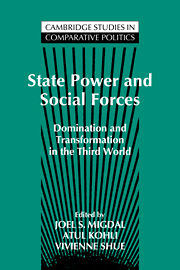Book contents
- Frontmatter
- Contents
- Preface
- List of contributors
- State Power and Social Forces
- Introduction: developing a state-in-society perspective
- PART I THEORETICAL AND METHODOLOGICAL CONSIDERATIONS
- PART II STATES: EMBEDDED IN SOCIETY
- PART III SOCIAL FORCES: ENGAGED WITH STATE POWER
- 6 Labor divided: sources of state formation in modern China
- 7 Business conflict, collaboration, and privilege in interwar Egypt
- 8 A time and a place for the nonstate: social change in the Ottoman Empire during the “long nineteenth century”
- 9 Peasant–state relations in postcolonial Africa: patterns of engagement and disengagement
- 10 Engaging the state: associational life in sub-Saharan Africa
- PART IV CONCLUSION
- Index
10 - Engaging the state: associational life in sub-Saharan Africa
Published online by Cambridge University Press: 05 June 2012
- Frontmatter
- Contents
- Preface
- List of contributors
- State Power and Social Forces
- Introduction: developing a state-in-society perspective
- PART I THEORETICAL AND METHODOLOGICAL CONSIDERATIONS
- PART II STATES: EMBEDDED IN SOCIETY
- PART III SOCIAL FORCES: ENGAGED WITH STATE POWER
- 6 Labor divided: sources of state formation in modern China
- 7 Business conflict, collaboration, and privilege in interwar Egypt
- 8 A time and a place for the nonstate: social change in the Ottoman Empire during the “long nineteenth century”
- 9 Peasant–state relations in postcolonial Africa: patterns of engagement and disengagement
- 10 Engaging the state: associational life in sub-Saharan Africa
- PART IV CONCLUSION
- Index
Summary
CIVIL SOCIETY AND STATE-SOCIETY RELATIONS
The fourth decade of African independence has coincided with a renewed interest in the nature of associational life on the continent. Observers, noting the number and variety of nongovernmental organizations, have viewed their current salience as a significant milestone in the restructuring of African political life. A major gap exists, however, between the grand theorizing on social organizations and the available empirical evidence. It is hardly surprising, therefore, that the conceptual tools employed to examine these phenomena have yet to transcend the intellectual confinement of the state–society dichotomy.
The notion of civil society, occupying the middle ground between communal groups and state structures, has been introduced to fill this void. First and foremost a linkage concept, civil society is “becoming an all-encompassing term to refer to social phenomena putatatively beyond formal state structures, but not necessarily free of all contact with the state.” When the term is not used loosely as a synonym for society, it has been conceptualized in the African context, alternately, as a necessary precondition for state consolidation, as the key brake on state power (and consequently in constant confrontation with the state), as a benign broker between state interests and local concerns, or as a medley of social institutions that interact with each other and with formal structures in ways that may either facilitate or impede governance and economic development.
- Type
- Chapter
- Information
- State Power and Social ForcesDomination and Transformation in the Third World, pp. 255 - 290Publisher: Cambridge University PressPrint publication year: 1994
- 9
- Cited by



